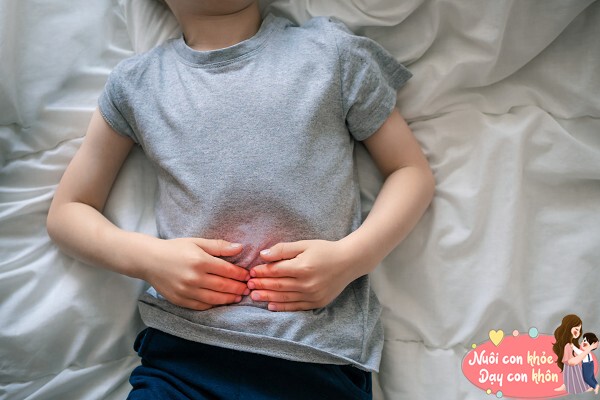A healthy digestive system is crucial for a strong immune system. Approximately 70% of the body’s immune cells are located in the gut, so maintaining gut health is essential to protect children from frequent illnesses. A well-functioning gut helps prevent the growth of harmful bacteria and strengthens the body’s defense against infections.
However, many parents often overlook the warning signs of digestive dysfunction in children.


Changes in Bathroom Habits
One of the first signs that a child’s digestion is struggling is a change in their bathroom habits. If your child suddenly experiences difficulty with bowel movements, frequent constipation, or diarrhea, it could indicate an abnormal gut function that needs attention.
Constipation
Constipation is a common issue for children, causing discomfort and pain. They may experience abdominal pain, a feeling of fullness, and discomfort. Constipation can be due to a lack of fiber or water in the diet or irregular bathroom habits.

Changes in bathroom habits can indicate digestive issues.
Diarrhea
On the other hand, if your child has loose stools and frequent bowel movements throughout the day, it could be a sign of diarrhea. Diarrhea can be caused by various factors, including viral or bacterial infections, food intolerances, or even a reaction to certain medications.
Diarrhea can quickly lead to dehydration, so it’s important to address this issue promptly.

Frequent Abdominal Pain
Young children often struggle to communicate their feelings effectively, making it challenging for parents to identify health issues. However, if your child frequently complains of abdominal pain, especially after meals, it’s a cause for concern. Abdominal pain can indicate various digestive problems, ranging from indigestion and bloating to more severe conditions like inflammatory bowel disease or stomach ulcers.
When abdominal pain occurs after meals, it could be indigestion, often resulting from eating too quickly, overeating, or consuming foods that don’t agree with the child’s digestion. Indigestion may be accompanied by symptoms such as a feeling of fullness, nausea, or acid reflux.
Another possibility is bloating, where air accumulates in the stomach and intestines, causing discomfort and pain. Greasy fried foods and carbonated drinks can also aggravate bloating.
If this occurs frequently, it’s important to reevaluate your child’s diet, ensure they eat at regular intervals, avoid excessive snacking before meals, and encourage thorough chewing.

Frequent abdominal pain can indicate digestive issues.

Loss of Appetite or Poor Appetite
If your child suddenly loses interest in food or eats very little, it could be a warning sign. Loss of appetite can lead to malnutrition and indicate underlying health issues.
Loss of appetite in children can stem from various causes, including digestive problems such as indigestion, bloating, or constipation. When a child feels uncomfortable due to digestive issues, eating becomes an unpleasant experience.

Irregular Weight Changes
Children typically follow a steady growth curve regarding weight gain, reflecting their overall health and nutrition. If you notice unexpected weight loss or a prolonged lack of weight gain, it could indicate digestive or general health issues.
As mentioned earlier, common causes include digestive problems such as indigestion, constipation, or inflammatory bowel disease. These issues can make children feel uncomfortable, leading to irregular or insufficient eating habits and sudden weight loss.

Digestive issues like indigestion, constipation, or inflammatory bowel disease can cause irregular weight changes.

Irritability and Moodiness
Young children are sensitive to changes in their bodies. If your child exhibits frequent irritability, moodiness, or crying spells, they may be experiencing digestive difficulties. Discomfort in the gut can lead to fatigue and irritability, making it hard for them to focus on daily activities.
Children are also emotionally sensitive. When their digestion is off, they may experience not only physical pain but also anxiety, frustration, or even fear.
These negative emotions can make them more irritable, and they may struggle to express their feelings effectively.

Children are sensitive to physical and emotional changes.

Bad Breath
Bad breath is often a sign of digestive issues such as indigestion or gastroesophageal reflux disease (GERD). The odor may originate from partially digested food or bacterial growth in the gut. When digestion is inefficient, food breakdown may occur incorrectly, producing unpleasant-smelling compounds.
One common cause of bad breath in children is indigestion. When children eat too quickly or consume difficult-to-digest foods, their stomachs work harder to process the food, leading to a buildup of gas and acid, resulting in bad breath.
Additionally, GERD can be a significant contributor. When stomach acid flows back into the esophagus, it can carry the taste and odor of digested food, causing bad breath. This condition is uncomfortable for children and may present with other symptoms such as chest pain, difficulty swallowing, or coughing.
|
Nutifood GrowPLUS+ is formulated by Nutifood Sweden, focusing on immune defense and healthy digestion. It contains: – 1 billion Bifidobacterium probiotics to help prevent constipation and inhibit harmful bacteria. – Soluble fiber FOS & Inulin to create an ideal environment for gut microbiota development. – Essential nutrients to support your child’s healthy development. Available as a powdered drink mix and ready-to-drink formula.
|
Trading Coffee for Green Tea: Unlocking 4 Special Health Benefits
“Trade in your coffee for a cup of matcha and unlock a world of surprising health benefits. Prepare to be intrigued as we delve into the wonders of this ancient brew and the positive transformations it can bring to your life. Get ready to explore a whole new perspective on your daily routine and discover why this simple swap might just be the key to a healthier you.”






































